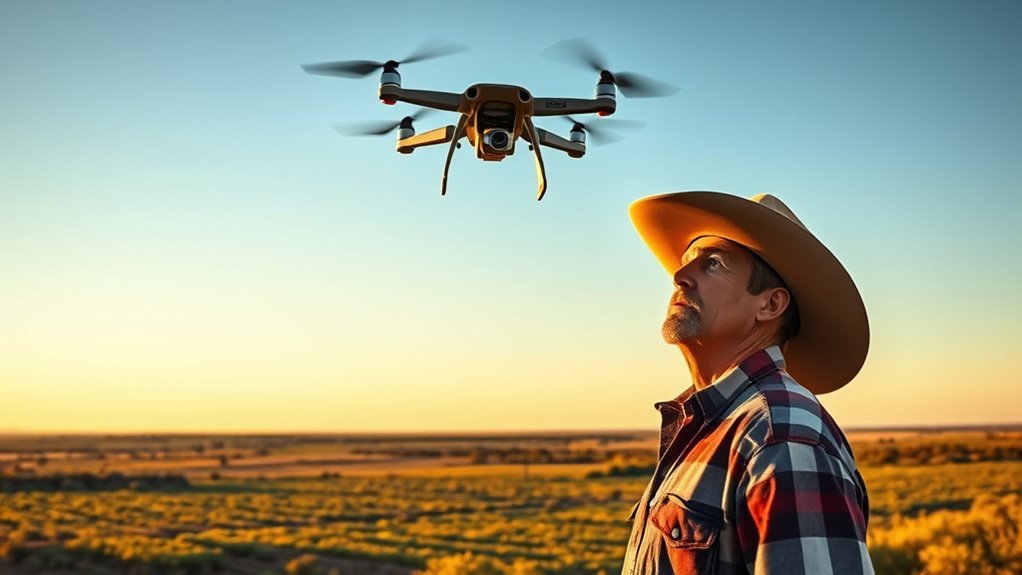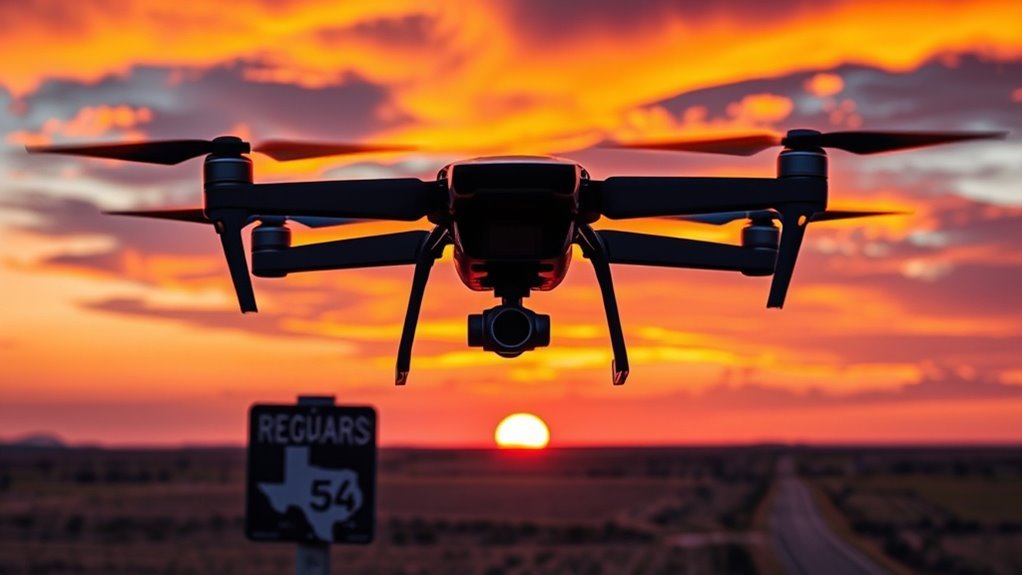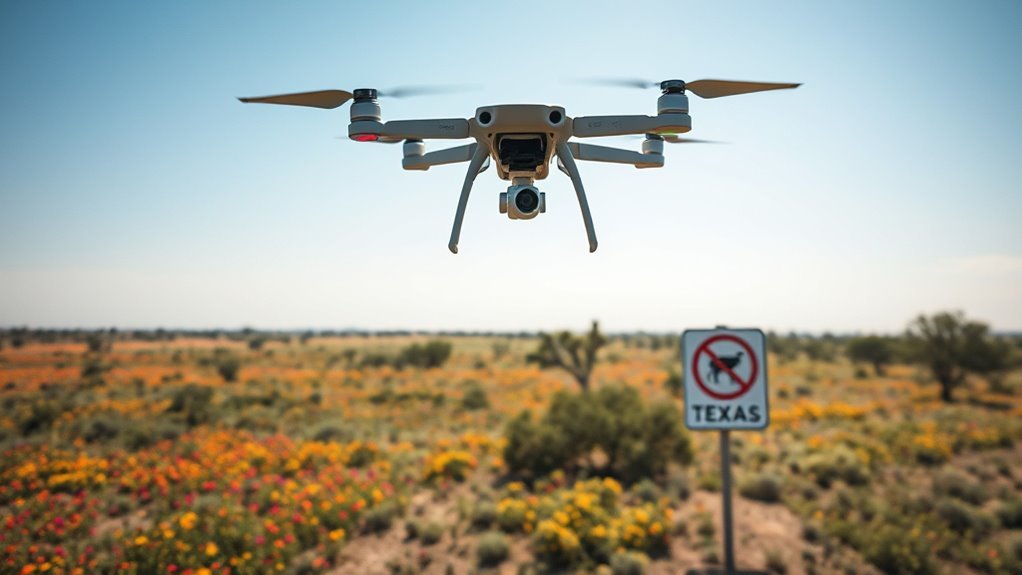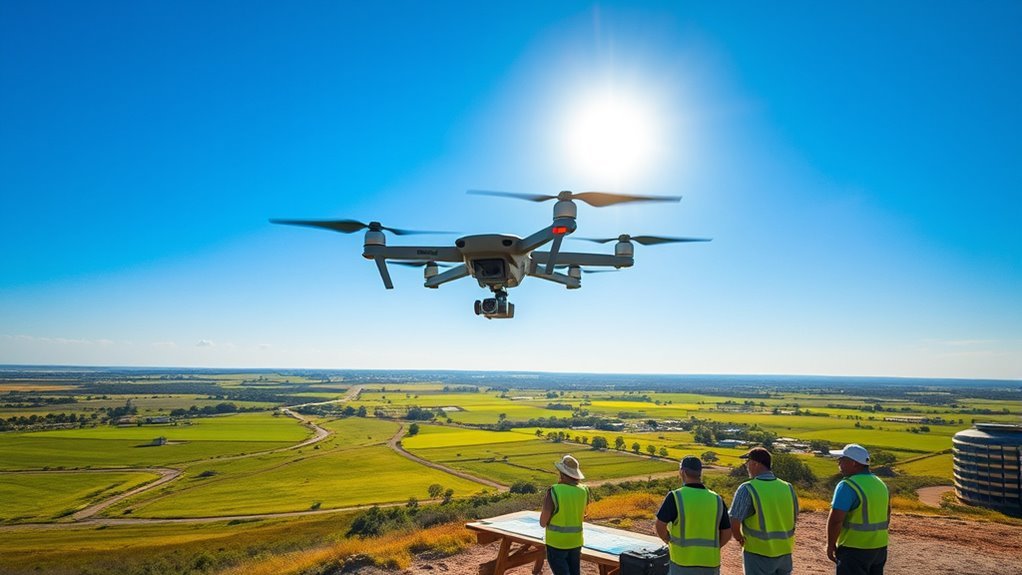In Texas, legal regulations for drones involve federal, state, and local laws. You must comply with FAA guidelines, which include operator certification and airspace rules. State laws focus on privacy, requiring consent to capture images in private spaces. Local ordinances may impose additional flight restrictions or permit requirements. If you’re not aware of existing regulations, you might face significant penalties. To guarantee compliance, it’s wise to stay informed about the latest rules governing drone operations.
Overview of Drone Regulations in Texas

While drone technology has rapidly advanced, the legal landscape governing its use in Texas remains complex and multifaceted. You’ll find that regulations vary considerably, affecting everything from commercial use to hobbyist activities. Texas has enacted laws requiring drone operators to adhere to specific guidelines, including the necessity of obtaining drone insurance for commercial operations. This insurance helps protect you against potential liabilities arising from accidents or damages. Additionally, operators must navigate local ordinances, which can impose further restrictions on where and how drones are flown. Understanding these regulations is essential for maintaining your freedom to operate drones without incurring legal repercussions. Staying informed about both state and local laws will empower you to utilize drone technology responsibly and effectively.
Federal Regulations Governing Drones

When operating drones, you need to understand the federal regulations set by the FAA. These rules outline not only the requirements for registration and pilot certification but also the airspace restrictions that impact where you can fly. Knowing these regulations is essential for compliance and safe operation in Texas.
FAA Regulations Overview
As the use of drones continues to expand across various sectors, understanding the Federal Aviation Administration (FAA) regulations governing these unmanned aerial vehicles is essential for operators. The FAA classifies drones based on weight and intended use, imposing specific requirements for commercial operations, such as obtaining a Remote Pilot Certificate. If you’re involved in drone technology for purposes like aerial photography, knowing these regulations helps guarantee compliance and safety. You must adhere to guidelines about maximum altitude, visibility, and no-fly zones. The FAA also emphasizes the importance of maintaining control over your drone at all times. By familiarizing yourself with these federal regulations, you can leverage the full potential of your drone while enjoying the freedoms it offers.
Airspace Restrictions Explained
Understanding airspace restrictions is vital for drone operators to secure compliance with federal regulations. The Federal Aviation Administration (FAA) classifies airspace into categories such as Class A, B, C, D, E, and G, each having specific rules regarding drone operation. For instance, flying in controlled airspace, like Class B, typically requires authorization. You also need to be aware of the maximum allowable drone altitude, which is generally capped at 400 feet above ground level unless you’re flying within a structure’s immediate vicinity. Violating these airspace classifications can result in penalties, so it’s important to familiarize yourself with these regulations. Staying informed not only safeguards your freedom to operate but also promotes safety in the skies for everyone.
Texas State Laws on Drone Usage

In Texas, understanding state laws on drone usage requires attention to privacy regulations and airspace restrictions. You’ll find that privacy laws aim to protect individuals from unauthorized surveillance, while airspace regulations dictate where and how drones can operate. Maneuvering through these rules is essential for responsible drone operation in the state.
Privacy Regulations
While drone technology offers numerous benefits, it also raises significant privacy concerns that Texas law seeks to address. You should be aware that Texas has specific regulations governing drone surveillance to protect privacy rights. These laws aim to balance technological advancements with individual freedoms. Key points to take into account include:
- Drones can’t be used to capture images or recordings of individuals in private spaces without consent.
- Law enforcement must obtain warrants to use drones for surveillance in most situations.
- Violations can lead to civil penalties, reinforcing the importance of adhering to privacy standards.
Understanding these regulations is essential for responsible drone usage, ensuring your activities remain within the legal framework while respecting the privacy of others.
Airspace Restrictions
As drone technology evolves, maneuvering airspace restrictions in Texas becomes essential for operators. Understanding airspace management is vital for guaranteeing compliance with federal and state laws. In Texas, you’ll need to be aware of controlled airspaces, such as those near airports, where flying drones without proper authorization can lead to serious legal consequences. Additionally, certain areas may be designated as no-fly zones, including military installations and national parks. Always check local regulations and consult resources like the FAA’s airspace classification system to confirm you’re operating within allowed parameters. By staying informed about these restrictions, you can enjoy the freedom drone technology provides while remaining responsible and compliant.
Local Ordinances Affecting Drone Operations
Local ordinances can considerably impact how you operate drones in Texas, often adding layers of complexity to state and federal regulations. Understanding these local rules is essential to guarantee compliance and avoid penalties from local enforcement. Here are some key factors to take into account:
- Zoning restrictions: Certain areas may have designated zones where drone operations are either restricted or prohibited.
- Flight altitude limits: Local laws might impose specific altitude restrictions that differ from federal regulations.
- Permitting requirements: Some municipalities may require permits for commercial drone use, adding another hurdle to your operations.
Privacy Concerns and Drone Surveillance
Given the increasing use of drones for various applications, privacy concerns have emerged as a significant issue in Texas. As surveillance technology advances, you might find yourself questioning the ethics surrounding drone usage. Are your privacy rights being compromised?
| Issue | Implication | Ethical Consideration |
|---|---|---|
| Unconsented Surveillance | Drones may capture images without consent | Violation of privacy rights |
| Data Security | Collected data can be hacked | Risk of misuse |
| Public vs Private | Distinction can be blurred | Ethical dilemmas arise |
| Accountability | Who’s responsible for misuse? | Need for regulation |
Balancing drone ethics with technological benefits is essential. Understanding these implications helps you advocate for responsible drone use while protecting your privacy.
Safety Guidelines for Drone Pilots
While maneuvering through the complexities of drone operation, it’s essential for pilots to adhere to established safety guidelines to minimize risks. Implementing these practices not only enhances safety but also fosters a responsible flying culture.
- Always maintain visual line of sight with your drone to prevent collisions.
- Invest in pilot training to improve your skills and understanding of regulations. Additionally, many areas require appropriate permits from relevant authorities to ensure compliance with local laws.
- Secure appropriate drone insurance to protect yourself and others in case of accidents. Understanding exclusions in policies can help ensure you get the right coverage for your needs.
Commercial Drone Operations and Licensing
As drone usage expands beyond recreational purposes, understanding the framework for commercial drone operations and licensing becomes increasingly important. To operate drones commercially in Texas, you’ll need to obtain the necessary commercial permits from the Federal Aviation Administration (FAA). This includes passing an aeronautical knowledge test to earn your Remote Pilot Certificate. Additionally, securing drone insurance is essential to protect yourself and your business from potential liabilities. Without proper insurance, the financial risks can be significant. Familiarizing yourself with local regulations, such as no-fly zones and altitude restrictions, is equally important. By adhering to these guidelines, you can guarantee compliant, safe, and efficient commercial drone operations in Texas, paving the way for a successful venture in this evolving industry.
Penalties for Violating Drone Regulations
Understanding the penalties for violating drone regulations is essential for anyone operating in Texas, since non-compliance can lead to serious consequences. Regulatory enforcement in this area is strict, and penalties can vary considerably depending on the nature of the drone violations. You might face:
- Fines ranging from hundreds to thousands of dollars, depending on the severity of the infraction.
- Possible confiscation of your drone, especially if it’s used in illegal activities.
- Criminal charges that can lead to misdemeanor or felony convictions, impacting your personal record.
Being aware of these potential penalties helps you navigate the regulations effectively, ensuring you can enjoy the freedom of flying without the burden of legal repercussions.
Frequently Asked Questions
Are There Age Restrictions for Drone Pilots in Texas?
Yes, there’s a minimum age of 16 for obtaining pilot certification to operate drones commercially. However, for recreational use, there’s no strict age limit, but supervision is recommended for younger pilots to guarantee safety.
Can I Fly Drones at Night in Texas?
You can fly drones at night in Texas, but you’ll need to equip your drone with proper lights for visibility. Night flying offers unique perspectives, but make certain you maintain safety and awareness of your surroundings.
Do I Need Insurance to Operate a Drone in Texas?
You don’t legally need insurance to operate a drone, but obtaining liability coverage is wise. Exploring various insurance options can protect you financially against potential damages, ensuring you enjoy your flying experience without unnecessary worries.
What Are the Drone Registration Requirements in Texas?
You’ll need to follow the federal drone regulations, which require registering your drone if it weighs over 0.55 pounds. The drone registration process is simple and guarantees you can operate freely and responsibly.
Can I Fly Drones Over State Parks in Texas?
You can’t fly drones over state parks in Texas without adhering to specific state park regulations. It’s essential to check designated drone flight zones to guarantee compliance and avoid potential penalties for unauthorized drone activity.

